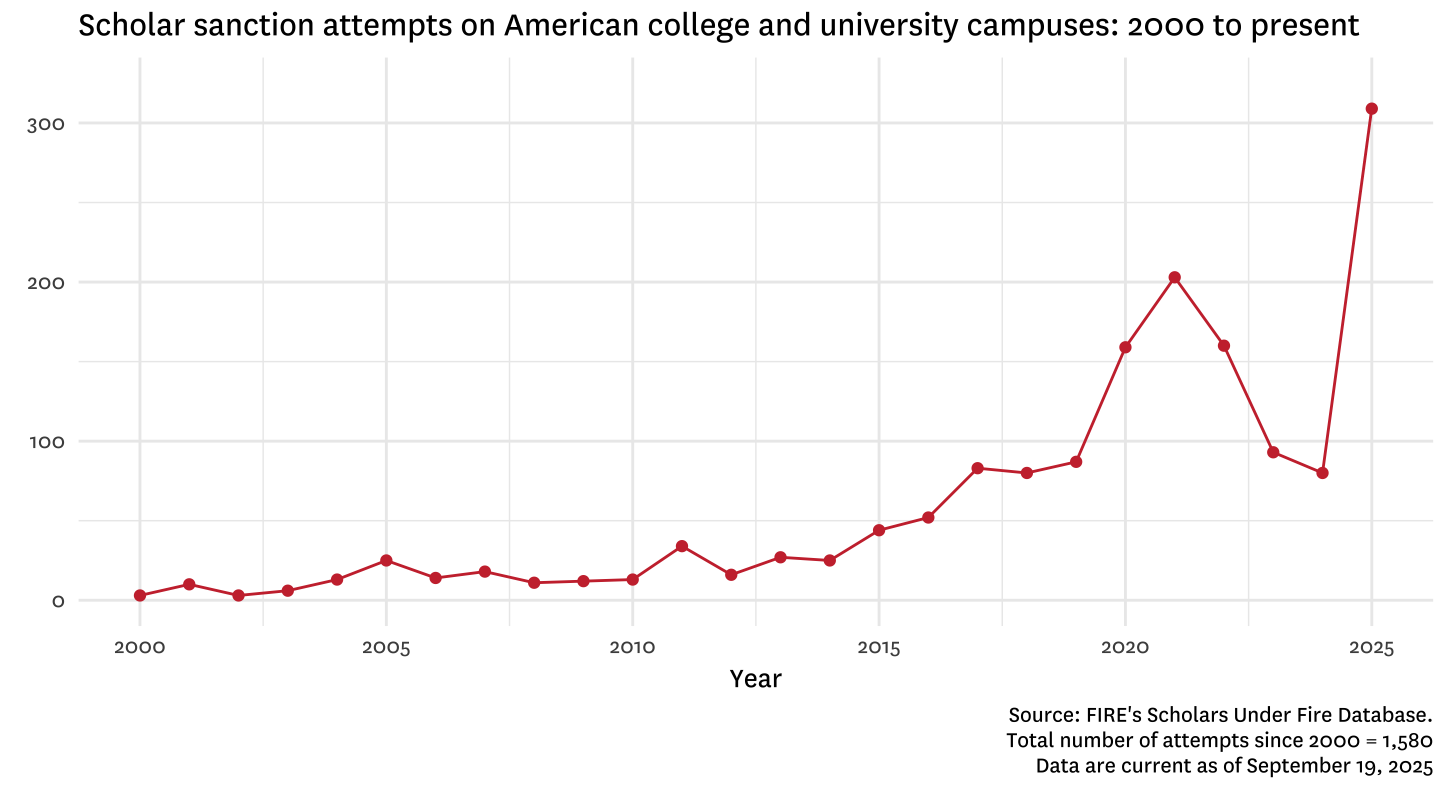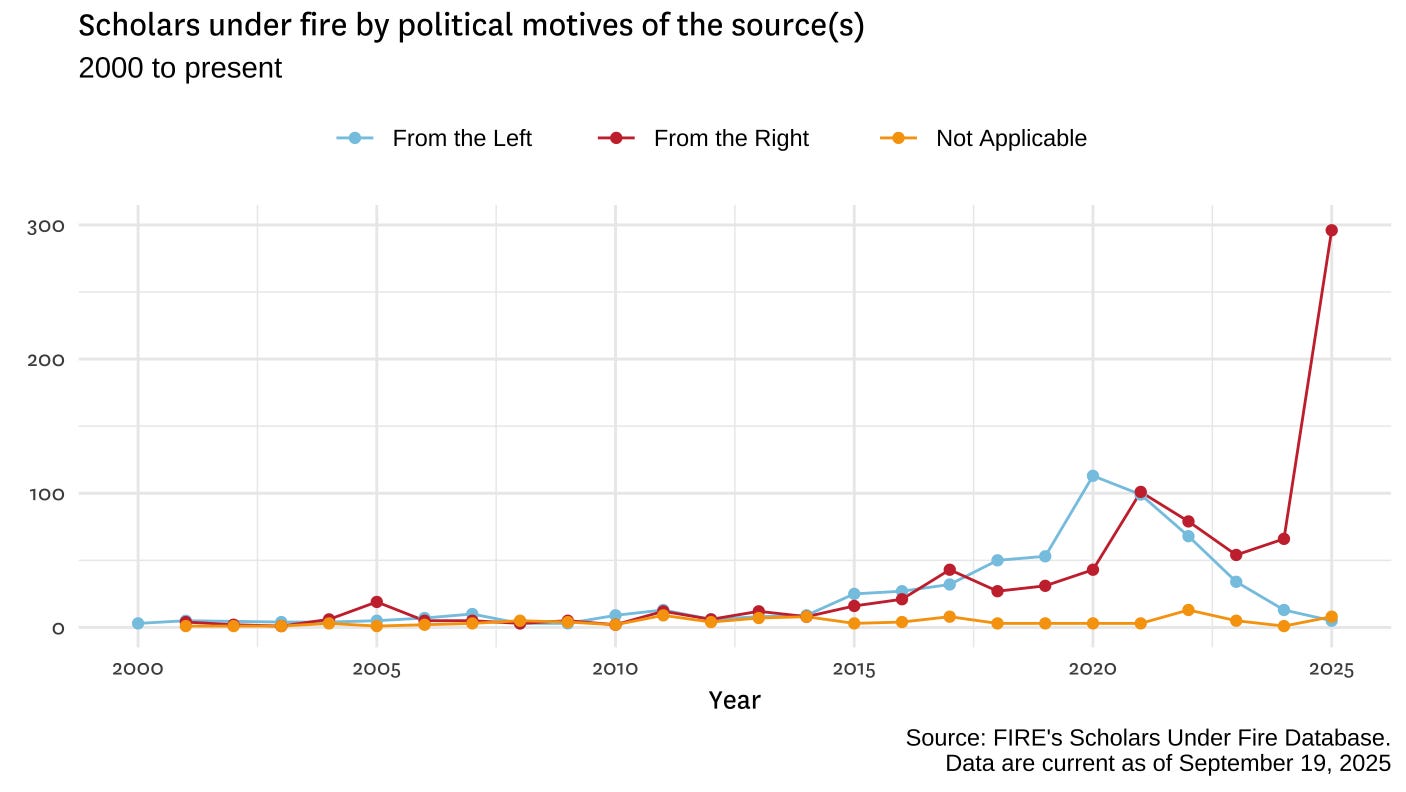Efforts to silence scholars hit record high
We’ve seen 309 in 2025 so far, up from 80 in 2024
In 2025, the U.S. government escalated its role in the war on academic speech. What used to be scattered pressure from students and faculty on campus, or from outside activist groups, has morphed into something far more chilling: a coordinated campaign, led by government officials, to punish scholars for their protected expression.
As of September 22, we’ve recorded 309 attempts to sanction a scholar this year alone. That’s more than one scholar targeted every day — the most we’ve ever recorded and 106 more than the previous record of 203 in 2021. And we only just started the fall semester.
Three incidents account for the bulk of this year’s record-breaking total:
The U.S. Naval Academy pulled nearly 400 books from its Nimitz Library after Defense Secretary Hegseth’s office told it to review “DEI content” per Executive Order 14190 — most were restored about a month later. We’ve only gone through half the titles so far but have already identified 164 scholar sanctions.
After the George Mason University Faculty Senate passed a resolution supporting their president, who was recently found in violation of Title VI by the Department of Education’s Office for Civil Rights, the Justice Department launched an investigation into the faculty, adding 51 scholars to our list.
After the killing of Charlie Kirk at Utah Valley University, several lawmakers called for professors to be fired over social media posts deemed “disrespectful” or “anti-American.” These calls, amplified by state legislators and federal officials, add 35 sanction attempts to the list, including 12 terminations.
This marks a disturbing shift in the landscape of campus free speech. Over the past decade, we’ve documented over 1,000 attempts to suppress scholars on college campuses. But rarely did those efforts originate from the government itself.
Now, almost all do. And they are coming mostly from the right of the scholar’s expression.
Public officials — armed with the authority to investigate, defund, or intimidate — are increasingly willing to wield that power against scholars who express dissenting or unpopular views. The effect isn’t limited to those directly targeted. It sends a message to faculty across the country: Speak carefully, or else.
At a moment when higher education is already under political siege, the rise of government-led sanction attempts represents more than a free speech crisis. It’s a test of whether public institutions will remain spaces for intellectual independence — or whether they will buckle under partisan control.
Unfortunately, many already, like the University of Michigan, the University of South Carolina, and the University of Tennessee have.
We’ve seen what happens when governments treat dissent as disloyalty. The warning signs are flashing again.








I see that you have not yet changed the bogus way you are counting “incidents” that you noted explicitly in your “vibe shift about campus censorship” piece.
From there:
FIRE defends individual rights, therefore we count each scholar as an individual entry, resulting in 111 of the 151 entries recorded in 2025 so far — and we’ve only reviewed about a third of the titles on the list for removal.”
So you continue the cheap, dishonest way claim that censorship from the right is up relative to the left.
Almost all past FIRE reporting has been about incidents of censorship.
But now you claim that the removal of a particular book from a library is a *separate* attack on a specific *scholar*?!?!? 🙄
Please.
Are you *really* claiming that you have reviewed the entirety of all past FIRE reporting and verified you held it to the same standard of “individual” rights in your counts?
I would be extremely surprised to find that that is the case.
By that logic, does that mean you counted the individual students who planned to attend and were denied their right to access to a given speaker when a speaker was not allowed to speak?
Of course you did not make such an impossible count.
Of course If you did, the claims of “balance” in censorship attacks on students up through 2024 would be preposterous.
Do you truly not see the double-standard in counting and presenting the censorship incidents from each side?!?
So by your logic, had there been 300 members of the GMU faculty Senate that would have been 300 incidents of attacks from the right instead of 55 (or the *correct* view, which is ONE incident of a particularly disturbing attack)? 🙄
For the rest of us who don’t want to have to spend the time to review each and every prior FIRE incident case, can you show us your work, or tell us when the “policy” about each book counting as an individual instance of censorship was made FIRE’s practice? Does this go back to early in the organization’s founding? Because it sure smells like a way to put the thumb on the scale…
And/or you are not reporting that in fact you count attacks against *students’* rights to be free from censorship by having speech denied to them differently from “scholars”.
Lies, damn lies and statistics I guess.
This counting of books removed as “incidents”, and of multiple faculty in a faculty senate each as separate “incidents”, is an indefensible double standard clearly done by motivated staff trying to show that the censorship on campus from the right has been close to equal that from the left.
And, I will add, is now being used to improperly claim that government incidents of censorship from the right are spiking.
It is incumbent on all of us to be defiant in the face of this attempt at repression. And to call out any administrators who bow to government pressure as the craven cowards they are.